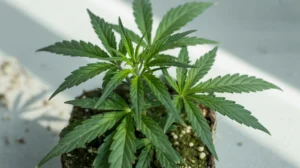Cannabis and Mental Health: Exploring the Connection

Whether you’re a seasoned cannabis user or are considering trying it for the first time, it is essential to understand how marijuana can affect your mental health. In this post, we will delve into the connection between cannabis and mental health, exploring the potential benefits and risks of its use.
Key Takeaways
- Cannabis may have the potential to improve psychological well-being
- Research suggests cannabis may be effective in managing anxiety and depression symptoms
- Different strains and dosages of cannabis may have varying effects on mental health
Understanding the Effects of Cannabis on Mental Health
When it comes to cannabis and mental health, there are various factors to consider. One of the most significant aspects of the cannabis plant is its potential for stress relief. Many people use cannabis to help alleviate stress and promote relaxation.
In addition to its stress-reducing properties, cannabis has also been studied for its potential to manage mental health disorders such as mood disorders. Research has suggested that cannabis may help regulate mood and improve symptoms related to depression and anxiety.
However, it is important to note that the effects of cannabis on mental health can vary depending on the individual and the specific strains and dosage used. While some people may experience benefits from using cannabis for mental wellness, others may experience adverse effects such as paranoia or anxiety.
Furthermore, there is ongoing research exploring the impact of cannabis on cognitive function. While some studies suggest that cannabis may impair cognitive abilities, others have found that it may improve certain cognitive functions such as creativity and problem-solving.
Overall, it is important to approach the use of cannabis for mental wellness with caution and to consult with a healthcare professional before incorporating it into a treatment plan.

Cannabis Therapy for Mental Health: Benefits and Risks
As we mentioned earlier, cannabis has the potential to contribute to one’s mental well-being. It may act as a therapeutic aid for a variety of mental health conditions, including anxiety and depression. Research has shown that the plant’s cannabinoids affect our brains’ receptors, leading to a calming effect that can help relieve anxiety and depressive symptoms.
However, it’s important to note that the use of cannabis for mental health is not without potential risks. It can lead to negative side effects, can impact cognitive function, and may even exacerbate certain mental health conditions. Additionally, individuals with a personal or family history of mental health issues may be more vulnerable to the negative consequences of using cannabis.
That being said, when used under proper medical guidance, cannabis therapy may be an effective tool for managing mental health symptoms. It’s crucial to consult with a healthcare professional and explore the potential risks and benefits before deciding to use cannabis for mental health purposes. Ongoing research is needed to further explore the impact of cannabis on mental well-being and provide comprehensive guidelines for its therapeutic use.

Cannabis therapy has the potential to be an effective tool for managing mental health symptoms, but it’s important to consult with a healthcare professional and explore the potential risks and benefits before deciding to use it.
Cannabis and Mental Health Treatment
As more research is conducted on the connection between cannabis and mental health, it is becoming increasingly clear that it may have significant therapeutic potential in managing various mental health conditions.
We have personally seen the impact that cannabis can have on individuals struggling with mental health disorders. While it is not a cure-all, it can be an effective tool in combination with other forms of treatment.
One of the key components of cannabis that is being studied for its mental health benefits is cannabinoids. These are the chemical compounds found in cannabis that interact with the body’s endocannabinoid system, which regulates various functions, including mood, sleep, and appetite.
| Cannabinoid | Effects |
|---|---|
| THC | Can have psychoactive effects and may exacerbate anxiety or psychotic symptoms in some individuals. |
| CBD | May have anti-anxiety and anti-inflammatory effects and has been shown to have potential in managing PTSD and depression. |
It is important to note, however, that the effects of cannabinoids can vary depending on the individual and the specific strain and dosage of cannabis used.
While there is still much to learn about the use of cannabis for mental health treatment, the potential for cannabinoid-based therapies is promising. Ongoing research in this field will help us better understand the mechanisms behind its effects and optimize its use in managing mental health conditions.

Cannabis and Anxiety: A Closer Look
When it comes to mental health, anxiety is one of the most prevalent and challenging conditions to manage. While there are various treatments available, including therapy and medication, some individuals have turned to cannabis as a potential alternative.
Research has shown that cannabis, specifically CBD, may have anxiolytic effects, meaning it can help reduce feelings of anxiety and stress. CBD works by interacting with the body’s endocannabinoid system, which helps regulate mood, stress, and other physiological responses.
One study published in the Journal of Psychopharmacology found that individuals with social anxiety disorder who took CBD before a simulated public speaking test experienced reduced anxiety levels compared to those who received a placebo.

However, it’s important to note that the effects of cannabis on anxiety can vary depending on dosage, method of consumption, and individual factors. Additionally, some strains of cannabis high in THC may actually exacerbate anxiety symptoms in some individuals.
As with any treatment, it’s crucial to consult with a healthcare professional before using cannabis for anxiety. Medical supervision can help ensure safe and effective use.
Cannabis and Depression: Exploring the Potential
In recent years, there has been growing interest in the potential of cannabis to treat depression. While research in this area is still in its early stages, there is evidence to suggest that cannabis may have therapeutic properties for individuals with depression.
One area of focus has been on the endocannabinoid system, which plays a role in regulating mood and emotions. Cannabis contains compounds called cannabinoids that interact with this system, potentially modulating the release of neurotransmitters like serotonin and dopamine that are involved in mood regulation.
While the potential benefits of cannabis for depression are promising, it is important to note that it is not a one-size-fits-all solution. Different strains of cannabis contain varying levels of cannabinoids and terpenoids, which can affect their impact on mood and emotions. Additionally, the effects of cannabis can vary widely depending on individual factors such as age, genetic makeup, and dosage.
As with any treatment, it is important to consult with a healthcare professional before using cannabis for depression. They can help determine whether cannabis is a suitable treatment option and provide guidance on dosage and strain selection. Additionally, individuals should be mindful of potential side effects, such as impaired cognitive function and increased heart rate.
While research into cannabis and depression is still in its early stages, there is evidence to suggest that it may have potential as a treatment option. However, more research is needed to fully understand its impact on mood and emotions, and individuals should exercise caution when using cannabis for depression.

Cannabis for PTSD: Breaking the Silence
Post-Traumatic Stress Disorder (PTSD) is a mental health condition that can occur after experiencing or witnessing a traumatic event. Individuals with PTSD often suffer from symptoms such as flashbacks, nightmares, and severe anxiety.
Research has shown that cannabis may have therapeutic potential for individuals with PTSD. The use of cannabis can help manage symptoms such as anxiety and insomnia, which are commonly associated with the condition.
One study found that individuals with PTSD who used cannabis experienced a significant reduction in symptoms. They reported decreased anxiety, improved sleep, and an overall improvement in their quality of life.
However, it’s important to note that cannabis may not be suitable for everyone with PTSD, and some individuals may experience negative side effects from its use. Additionally, the legality of cannabis use varies by state and country, so it’s important to research and understand local laws and regulations.
The potential benefits of cannabis for managing PTSD symptoms are promising, but further research is needed to fully understand its efficacy and safety.

Cannabis and Mental Health: Considerations and Precautions
While cannabis may have potential benefits for mental health, it’s essential to be mindful of the potential risks and considerations before using it as a treatment option.
Dosage is a critical factor to consider when using cannabis for mental health purposes. It’s crucial to start with a low dose and gradually increase it to avoid adverse reactions. Additionally, strain selection is essential, as different strains of cannabis can have varying effects on mental well-being.
Individuals should be aware of potential side effects when using cannabis for mental health conditions, such as drowsiness, impaired coordination, and altered perception. It’s also crucial to note that cannabis can interact with other medications, so it’s essential to consult a medical professional before use.
It’s worth noting that cannabis use can have varying effects on different individuals, with some experiencing positive effects and others experiencing adverse reactions. As such, it’s crucial to approach cannabis use for mental health with care and caution and be mindful of any changes in symptoms or side effects.
Overall, while cannabis may have potential benefits for mental health, it’s essential to proceed with caution and consider the potential risks and considerations before using it as a treatment option.

Cannabis and Mental Health Disorders: A Comprehensive Overview
As research into cannabis and mental health continues to evolve, it is becoming increasingly clear that cannabis has the potential to treat a wide range of mental health disorders.
One of the most well-studied areas of cannabis and mental health is its potential as a treatment for anxiety disorders. Studies have shown that cannabis, particularly strains high in CBD, can reduce symptoms of anxiety and help individuals manage stress more effectively.
| Mental Health Disorder | Potential Benefits of Cannabis |
|---|---|
| Depression | Cannabis may alleviate depressive symptoms and improve mood |
| PTSD | Cannabis may reduce symptoms of PTSD and help individuals manage anxiety and stress |
| Bipolar Disorder | Cannabis may help regulate mood and reduce symptoms of mania |
| Schizophrenia | Cannabis may alleviate symptoms of psychosis and improve cognitive function |
In addition to these disorders, research is also exploring the potential use of cannabis in treating conditions such as ADHD, OCD, and eating disorders.
While the potential benefits of cannabis for mental health disorders are significant, it is important to note that there are also potential risks associated with its use. Cannabis use may worsen symptoms in some individuals, and there are concerns about the impact of long-term cannabis use on cognitive function.
As with any treatment option, it is important for individuals to carefully consider the potential benefits and risks of cannabis use for their specific condition and work closely with a healthcare provider to develop a treatment plan.

Indeed, the relationship between cannabis and mental health disorders is complex and multifaceted. While further research is needed to fully understand the potential benefits and risks of cannabis use for mental health, the current evidence suggests that cannabis has the potential to be an effective treatment option for a wide range of mental health conditions.
The Future of Cannabis in Mental Wellness
As the legalization of cannabis continues to gain momentum worldwide, the future potential of cannabis in mental wellness is becoming an increasingly popular area of interest. With ongoing research and development, it is anticipated that cannabis could revolutionize the way mental health conditions are treated and managed.
Studies have shown that cannabis has the potential to help manage a range of mental health issues, including anxiety, depression, PTSD, and more. Additionally, ongoing research is exploring the various cannabinoids found in cannabis and their potential therapeutic benefits. As research continues, we may see more targeted treatments that can help individuals manage their symptoms more effectively.
Furthermore, the integration of cannabis into traditional mental health treatments is also being explored. Some mental health professionals have already begun incorporating cannabis into their treatment plans, utilizing it in combination with other therapies to provide a more holistic approach to mental wellness.
While there is still much to learn about the impact of cannabis on mental health, early findings are promising. As we continue to explore the potential of cannabis in mental wellness, it is important to approach its use with caution and under the guidance of a qualified healthcare professional.
The future of cannabis in mental wellness is exciting, and with proper research and responsible use, it has the potential to improve the lives of millions of individuals struggling with mental health conditions.

Cannabis and Mental Health: Conclusion
After exploring the complex relationship between cannabis and mental health, it is clear that there is still much we do not know. While there is potential for cannabis to contribute to mental well-being, it is important to acknowledge the risks and limitations associated with its use.
The current research surrounding cannabis and mental health is promising, but much more work is needed to fully understand the effects of cannabis on different mental health conditions. Additionally, it is important to recognize that cannabis is not a one-size-fits-all solution and that individual experiences may vary.
Looking Forward
As we move forward, it is essential that we continue to explore the potential benefits and risks of using cannabis for mental health purposes. Ongoing research will be crucial in understanding the impact of cannabis on different mental health conditions and guiding individuals in their decision-making regarding cannabis use.
Furthermore, it is important that individuals approach cannabis use for mental health purposes with caution and consideration. Always consult with a healthcare professional before using cannabis as a treatment option and be aware of the potential risks and side effects.
Final Thoughts
The relationship between cannabis and mental health is nuanced and complex. While there is potential for cannabis to contribute to mental well-being, there are also limitations and risks that must be considered. It is important that individuals approach cannabis use for mental health purposes with caution and awareness of both the potential benefits and potential risks.
Now that you understand the connection between cannabis and mental health, check out the collection of regular, feminized, and autoflower cannabis seeds at Seeds Here Now.
FAQ
Q: What are the mental health benefits of cannabis?
A: Cannabis has shown potential in managing anxiety and depression, contributing to psychological well-being.
Q: How does cannabis affect mental health?
A: Cannabis can provide stress relief, help manage mental health disorders like mood disorders, and impact cognitive function. Ongoing research is being conducted in this area.
Q: What are the benefits and risks of using cannabis for mental health?
A: Cannabis may contribute to mental well-being and therapy. However, it is important to consider the associated risks and ongoing research in this field.
Q: What is the role of cannabis in mental health treatment?
A: Cannabis, specifically cannabinoids, may have a role in managing various mental health conditions. However, further research is needed to fully understand its potential.
Q: Can cannabis be used to manage anxiety?
A: Cannabis, particularly CBD, has shown potential in managing anxiety symptoms and aiding in stress management.
Q: Does cannabis have the potential to manage depression?
A: Cannabis, specifically marijuana, has been explored for its therapeutic use in alleviating depressive symptoms, however, more research is needed.
Q: How can cannabis help individuals with PTSD?
A: Cannabis may potentially help individuals with Post-Traumatic Stress Disorder (PTSD) manage their symptoms and improve their quality of life.
Q: Are there personal experiences of managing mental health with cannabis?
A: Yes, individuals have reported positive experiences using cannabis to manage their mental health conditions and improve their overall well-being.
Q: What considerations and precautions should be taken when using cannabis for mental health?
A: Factors such as dosage, strain selection, and potential side effects should be considered when using cannabis for mental health purposes.
Q: How does cannabis relate to various mental health disorders?
A: There is ongoing research on the relationship between cannabis and various mental health disorders, exploring its potential as a treatment option.
Q: What is the future potential of cannabis in mental wellness?
A: The future of cannabis in mental wellness holds promise, with ongoing research potentially revolutionizing mental health treatment and enhancing overall well-being.
Suggested Articles
;)
;)
;)




 29 Jan 2026
29 Jan 2026  8 min read
8 min read


 November 16, 2023
November 16, 2023 


RESPONSES (0)
No responses yet. Be the first to respond!